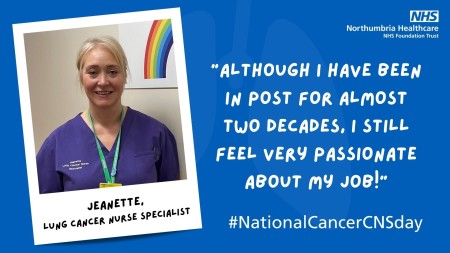Publish date: 26 April 2023
Lung cancer nurse specialist Jeanette talks about her passion for her career almost two decades later on #NationalCancerCNSDay 2023

Hi, my name is Jeanette and I have worked in the Trust for over 30 years, 17 of which has been as a lung cancer nurse specialist. I work across the base sites and NSECH, and support patients trust wide, providing information, advice and support for patients through their cancer journey, from pre-diagnosis through treatment and beyond including end-of-life care. Although it can be challenging at times, it is also very rewarding, and I feel lucky to be part of a great team of nurses and consultants.
My working week can be quite varied, with a combination of clinic and inpatient reviews as well as providing direct telephone access for patients and carers where we are able offer general advice, symptom management, and work with other services within primary and secondary care to coordinate patient care and reduce unnecessary hospital admissions.
As well as meeting new referrals in clinic at the base sites, we have adapted our service to cover NSECH, as a large proportion of new patients first present via this route. By doing this, we have been able to arrange further investigations, provide contact information for our team, manage symptoms on discharge, and coordinate follow up, which has reduced additional clinic appointments and improved patients experience. One part of the role I particularly enjoy is advocating for patients, ensuring they understand their diagnosis and treatment options, and ensuring they feel part of the decision-making process for their care.
We have recently started a preoptimization clinic for patients who are due to undergo radical treatments such as surgery, radiotherapy or chemoradiation. The aim of this is to optimize patient fitness, nutrition, and wellbeing before treatment, as evidence has shown that improving these areas can make a difference in how well they cope with their treatment and recovery. I’m really enjoying this clinic, as it allows us to address patients questions and concerns post diagnosis, and it also gives patients the opportunity be actively involved in their care and make positive changes. Although it is in its early stages, initial patient feedback has been very encouraging, and we have seen increased referrals to the stop smoking team, which is a positive step.
Our service has also recently been part of an early screening programme in North Tyneside, aiming to identify lung cancers at an early stage, and this has already proven to be very successful, resulting in some patients being referred on for surgery. This programme has now rolled out across Northumberland, which is very positive, and I am looking forward to seeing it develop further and how we can help support this.
During my time in post, the service has grown and changed significantly, and it has been exciting to see the development of newer, more targeted and complex treatments available to patients. As a nursing team, we are constantly looking at how we can help support the new initiatives and services we provide, working closely with oncology and palliative care colleagues to manage patients care – this has provided a great learning opportunity for me and the rest of the team, and although I have been in post for almost two decades, I still feel very passionate about my job.
